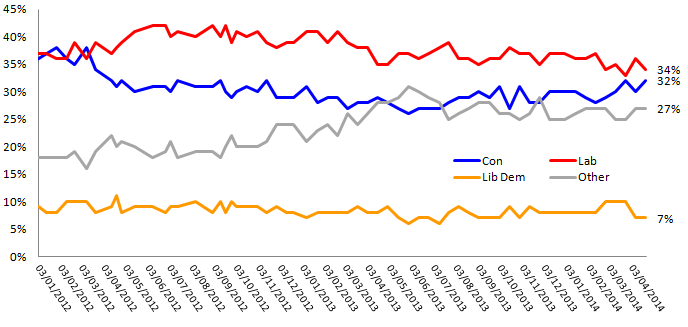Political Polling – 22nd April 2014
22nd April 2014
Labour?s lead shrinks again to just two points as the Conservatives gain. Labour have 34% of the vote vs. 32% for the Conservatives.
Meanwhile, the Liberal Democrats remain on their post-debate low of 7%, behind Nigel Farage’s UKIP which has also held steady on 18%.


| † | % | Change |
| Conservative | 32 | +2 |
| Labour | 34 | -2 |
| Liberal Democrats | 7 | n/c |
| Other parties | 27 | n/c |
Other Parties (breakdown)
| † | % | Change |
| UKIP | 18 | n/c |
| Green | 3 | n/c |
| SNP | 3 | -1 |
| BNP | 1 | n/c |
| Plaid Cymru | 1 | n/c |
| Other | 1 | n/c |
Approval ratings
| † | % Approve | % Disapprove | Net rating | Net rating (own party) |
| David Cameron | 38% | 46% | -8% | +86% |
| Ed Miliband | 24% | 46% | -22% | +35% |
| Nick Clegg | 16% | 58% | -42% | +38% |
| Nigel Farage | 34% | 34% | 0% | +81% |
Opinium Research carried out an online survey of 1,965 GB adults aged 18+ from 22nd to 25th April 2014. Results have been weighted to nationally representative criteria.
Interview Method and Sample
This survey is conducted online by CAWI (computer aided web interviewing), using Opinium?s online research panel of circa 30,000 individuals. This research is run from a representative sample of GB adults (aged 18+ in England, Scotland and Wales). The sample is defined from pre-collected registration data containing gender, age (18-34, 35-54, and 55+), region (North East, North West, Yorkshire and Humberside, East Midlands, West Midlands, East of England, London, South East, South West, Wales, and Scotland), working status and social grade to match the latest published ONS figures.
Opinium also takes into account differential response rates from the different demographic groups, to ensure the sample is representative.


